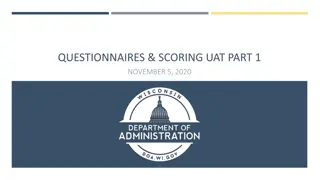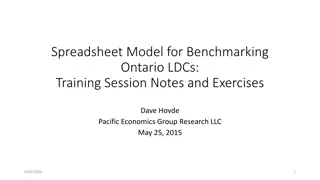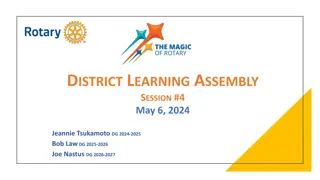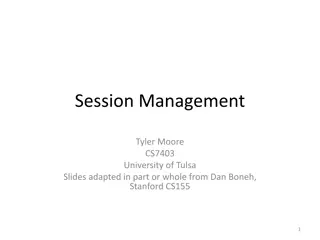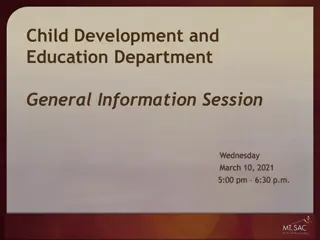
The Role of State and Market in Development II
Explore the role of market economy as an alternative to development planning and state intervention. Discover the importance of the state in collaboration with the private sector for effective development. Key topics include the effectiveness and limitations of market mechanisms for economic growth and efficiency.
Download Presentation

Please find below an Image/Link to download the presentation.
The content on the website is provided AS IS for your information and personal use only. It may not be sold, licensed, or shared on other websites without obtaining consent from the author. If you encounter any issues during the download, it is possible that the publisher has removed the file from their server.
You are allowed to download the files provided on this website for personal or commercial use, subject to the condition that they are used lawfully. All files are the property of their respective owners.
The content on the website is provided AS IS for your information and personal use only. It may not be sold, licensed, or shared on other websites without obtaining consent from the author.
E N D
Presentation Transcript
THE ROLE OF THE STATE AND MARKET IN DEVELOPMENT II Lecturer: Dr. Maame Adwoa A. Gyekye-Jandoh Contact Information: mgyekyej@yahoo.com College of Education School of Continuing and Distance Education 2014/2015 2016/2017
Session Overview Overview In this session we examine an alternative to central or development planning and state intervention in the economy markets. You will be familiarized with the case made for market economies as better mechanisms for development of the less developed countries, as well as the conditions or requirements for the effective operation of markets. Some limitations of the market will also be highlighted. In light of the limitations of the market, we argue that the state still has a role to play in development, but in collaboration with the private sector (market). Slide 2
Session Outline The key topics to be covered in this session are as follows: Topic One: Is the Market Economy an Alternative to Development Planning and State Intervention? Topic Two: Why Should the State Play a Role in Development? Slide 3
Reading List Todaro, Michael. 2000. Economic Development. England: Pearson Education Limited. Michael Todaro and Stephen Smith (2012). Development Policymaking and the Roles of Market, State, and Civil Society. p. 511-516; 524-533 Slide 4
Topic One IS THE MARKET ECONOMY AN ALTERNATIVE TO DEVELOPMENT PLANNING AND STATE INTERVENTION? Slide 5
Is the Market Economy an Alternative to Development Planning and State Intervention? As a result of the failure of development planning in many developing countries, there was a call, from several practitioners, development agencies and scholars around the world, for an increased use of the market as a key mechanism for promoting greater economic growth and efficiency. By the 1980s and 1990s, several developing countries had set in motion major economic reforms in the direction of the free market in the hope that the invisible foot would be more effective for economic growth and development than the visible hand of development planning. Slide 6
The Market Economy as an Alternative to Development Planning? Many countries that had previously embraced development planning (India, Tanzania, Sri Lanka, Jamaica, Turkey, and even Ghana, for example, as well as Russia and other Eastern European countries) now sought to reduce the role of the public sector, encourage private-sector activity, and address distortions in wages, interest rates, and prices of consumer goods. They also sought to improve their comparative advantage on the global market by lowering exchange rates, promoting exports, and eliminating protection (Todaro 2000). Slide 7
Socio-cultural Preconditions for the Market Economy Socio-cultural Preconditions for the Market Economy A well-functioning market system requires special social, institutional, legal, and cultural preconditions that are often absent in developing countries. As Todaro (2000: 642) has nicely put it, fraud, corruption, and monopoly do not disappear with the wave of a magic neoclassical wand. Below are 14 institutional and cultural requirements for the operation of effective private markets. Slide 8
Socio-cultural Preconditions for the Market Economy 1. The first and foremost requirement is trust (in banks, insurance companies, suppliers, etc); 2. Law and order (enforcement of contracts) ; 3. Security of persons and of property; 4. Balancing competition with cooperation (for a safe workplace and a cleaner environment); 5. Division of responsibility and diffusion of power (an independent judiciary); 6. Community altruism (a social safety net for the impaired, chronically unemployed, the elderly, etc); 7. Social mobility, legitimation of ambition, and toleration of competitiveness. Slide 9
Socio-Cultural Preconditions for the Market Economy continued The remaining requirements are: 8. Materialistic values as a stimulus to greater production; 9. Deferring gratification to generate private saving; 10. Rationality unconstrained by tradition; 11. Honesty in government; 12. Efficient forms of competition, as opposed to monopolistic control; 13. Freedom of information (along with protection of privacy); and 14. Flows of information without restrictions or favoritism. Slide 10
Limitations of the Market in Developing Countries (DCs) The setbacks to market reforms in Eastern Europe and Russia and in many Asian countries are largely attributable to the absence of some or many of the institutional preconditions and market practices. Limitations of the Market in Developing Countries Markets are in reality characterized by widespread imperfections or limitations in most developing countries. 1. Most individual producers and consumers face uncertainty in the market, and also lack information about the size of local markets, the presence of other producers, and the availability of inputs, whether domestic or imported. Consumers also may not be sure about the quality and availability of products and their substitutes. Slide 11
Limitations of the Market in DCs 2. The lack of effective competition. Imperfect competition exists in most LDCs, particularly in the industrial sector where there are often monopolies. Often the result is an inefficient allocation of resources, and so the government must intervene to limit monopoly power by regulating firm size or controlling prices. 3. Even if markets allocated resources efficiently, developing country governments still have to think about the long-term allocation of resources. Governments may have to invest in infrastructure, especially in the early stages, which is crucial because it allows for subsequent investment by both the private and the public sectors. Governments also have to help with human capital the education and training of a labour force to raise productivity. Slide 12
Limitations of the Market in DCs 4. Although the market mechanism may be more efficient overall for the economy, it can produce a highly unequal distribution of income. A strong welfare case can therefore be made for government intervention because of this inequity (Todaro 2000: 644-645). Thus, note that the market mechanism can fail due to widespread imperfections and special concerns that many developing countries face. This may mean that greater and more effective cooperation is needed between the public (government) and private (market) sectors in order to offset the limitations of each and achieve the best results. Slide 13
Sample Questions Identify six important socio-cultural preconditions for a market economy, and briefly explain why you think these are necessary for the effective functioning of a market economy. Choose any two of the limitations of the market described above, and explain briefly why they call for cooperation between, the public and private sectors for economic development. Slide 14
Topic Two WHY SHOULD THE STATE PLAY A ROLE IN DEVELOPMENT? Slide 15
Why Should the State Play a Role in Development? It is very important to note that economic policies are ultimately made by politicians rather than planners, and these politicians may be more interested in surviving economic crises as they come and remaining in power, than in making any substantial changes and strides toward development (Todaro 2000: 647). This situation has, however, began to change since the 1980s when many developing nations, particularly in Africa, were faced with shortage of foreign exchange, excessive inflation, etc. in economic crises that called for widespread economic and social reform. Slide 16
Reasons Why the State should Play a Role in Development Most developing countries are faced with conflicting interests elitist and egalitarian that influence the direction of economic policies. The stronger interests usually gets their way, but in recent times, developing country governments have taken on increased responsibility for the management and direction of their economies. 1. You must note that in Africa especially, governments/states are the major producers and distributors of resources, which therefore makes them by default the major inducers of development. 2. Governments in Africa also are the most important users or employers of trained workers. It is therefore crucial, for the success or failure of development, how they deploy these limited human resources. Governments, in short, have been, and will continue to be, vitally important for the management of development. Slide 17
Reasons Why the State should Play a Role in Development After independence most LDCs adopted the mixed market system combined with central planning, but with public-sector participation in all aspects of economic activity. The role of the state today has greatly increased due to the rising concerns with poverty and inequality. Despite the shortcomings of many LDC governments (too cumbersome, many inefficient public corporations, too centralized and urban-oriented, too much corruption and little innovation, and bureaucratic red tape), they must ultimately assume active responsibility for the future well-being of their countries. This will require large scale innovation and change, with institutional and structural reform in the fields of land tenure, taxation, asset ownership and distribution, educational and health delivery systems, credit allocation, labor relations, and pricing policies. Slide 18
The Role of the State in Development Nevertheless, some scholars have predicted that the public sector (state/government), whether centralized or decentralized, whether jointly with private enterprise (market) or on its own, will in the coming decades continue to claim major responsibility for the commanding heights of most developing economies (Todaro 2000: 648). Question to consider: List at least four shortcomings of LDC governments, and at least four areas where change must come in order for LDC governments to adequately respond to the challenge of managing development. Slide 19
Conclusion of Session 10 In this session, we have looked at the nature and limitations of the market economy as an alternative to development planning and state intervention. Reasons why the state, despite its shortcomings, will continue to play a role in development of many a LDC, although probably side by side with the market/private sector, have also been given. The state, in collaboration with the market, will be better positioned to tackle not only issues of raising economic growth, but also reducing poverty and inequalities. In the last two sessions of this course, Sessions 11 and 12, we will examine critical issues for the 21st century. Slide 20
References Todaro, Michael. 2000. Economic Development. England: Pearson Education Limited. Michael Todaro and Stephen Smith (2012). Development Policymaking and the Roles of Market, State, and Civil Society. p. 511-516; 524- 533 Slide 21


